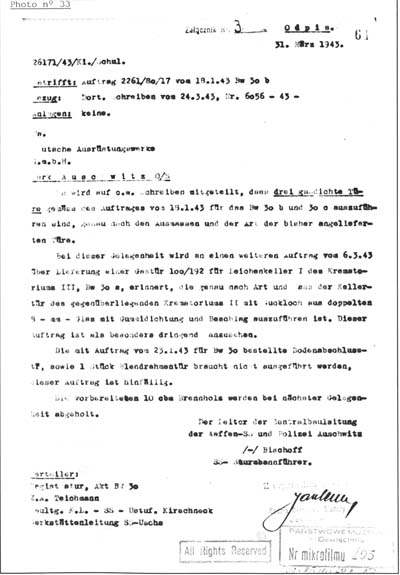|
|
 |
 |
AUSCHWITZ:
Technique
and Operation
of
the Gas Chambers © | |
|
| |
 |
Back |
 |
Contents |
Page 452 |
 |
Home
Page |
Forward |
 |
| |
| 24. |
4 dichte Türen, mit
Türfutter / 4 tight doors, with lining
[Annex 15 to volume 11 of the Hoess trial, concerning
“Schlosserei WL”, Order No 109 of 19th February 1943] |
[Photo 32] |
| |
|
|
| |
|
Translation:
|
|
| |
|
|
|
| |
|
19/2/43 No 109 POW
camp worksite 30b (Krematorium IV] |
|
| |
|
Subject: 4 tight
doors. with lining — in accordance with Construction Management
instructions. Dimensions 100 x 205 cm as per Order 2261/80/17 of
19th January 1943 issued by the Construction Management. Order
transfered from the former prisoners’ metalworking shop. |
|
| |
|
|
|
| |
This order might be
thought perfectly normal, since it is simply for “eight doors”, but
is in fact criminal and requests “4 [gas]dichte Türen”. The letter
of 31st March 1943 [Photo 33] is mainly concerned with the
non-execution of this order, originally classified 2261/80/ 17 of
18th January 1943 and recalls that they are gas-tight doors.
The number of doors has been reduced to three, a change explained by
the envisaged method of using Krematorium IV. While fifteen days
elapsed between the gas-tight windows being ordered and their being
fitted in Krematorium IV, the order for the doors. issued a month
earlier, was still not executed. Furthermore, the letter of 31st
March 1943 proves that almost another month and a half had passed
and the situation remained unchanged. It must be observed that the
transfer of orders from the former prisoners’ metalworking shop to
that of the DAW was slow. As Krematorium IV was handed over on 22nd
March and on the 31st March its gas-tight doors were still not
ready, it can be concluded that it was not yet operational when it
was accepted and only became so much later. It may be that the doors
fitted in Krematorium V on 16th and 17th April were those ordered
for Krematorium IV, which would explain the new orders for
Krematorium IV issued on 16th April. |
| |
|
|
| 25. |
drei gasdichte Türe
(Türme, Türen)/ three gas-tight doors (towers, doors) |
[Photos 33, 34,
35] |
| · |
[Türe: Annex 3
(page 61) of Volume 11 (microfilm 205) of the Hoess trial certified
an authentic copy by the Polish examining judge Jan
Sehn; |
|
| · |
Türme: File BW
30/34, page 49. First carbon copy of the letter of 31st March 1943.
No 26171/43, containing the word “Türme / towers” twice: |
|
| · |
Türen: File BW
30/34. page 50. Second “corrected” carbon copy, with one of the two
“Türme” changed to “Türen”.] |
|
| |
|
|
| |
Letter of 31st March
1943, signed by SS Major Bischoff, drafted and countersigned by SS
Second Lieutenant Kirschneck, addressed to the DAW and referring to
Order 2261/80/17 of 18th January 1943 for BW 30b [Krematorium IV].
Only the first paragraph concerns this order. |
| |
|
|
| |
|
Translation:
|
|
| |
|
|
|
| |
|
In reply to the above
letter [of 24th March 1943], it is confirmed that three gas-tight
doors are to be made for worksites 30b [Krematorium IV] and 30c
[Krematorium V] in accordance with the order of 18th January 1943,
exactly of the same dimensions and pattern as the doors supplied
previously. |
|
| |
|
|
|
| |
The subject of the
letter is an order for Krematorium IV, while the first
paragraph attributes it to Krematorien IV AND V. The singular
article “das / the” used to cover buildings 30b and 30c demonstrates
the habit of those involved in the building of Krematorien IV and V
refering to them as a single job or worksite to be distinguished
from that of Krematorien II and III, again generally regarded as a
unit. This practice arose because of the different natures of the
two pairs of buildings. The three gas-tight doors were to make
gas-tight the entire unit comprising the two rooms and corridor in
the western part of Krematorium IV. Certain revisionists rushed to
explain this order for “drei gasdichte Türe“ (for the premises
called “Gas[s]kammer” and fitted with “Gas[s]dichtefenster”) as
being connected with the installation of DISINFECTION [sic] gas
chambers in Krematorium IV, supposedly to treat the clothing of the
dead lying in the morgue (central room of the building). We may then
ask what was the purpose of the three disinfestation autoclaves and
the four Topf hot air disinfestation chambers or ovens in the
Zentral Sauna, located only 110 metres away. Some of those who
refuse to admit the existence of homicidal gas chambers for
large-scale operation, unable to provide any reasonable explanation
for this avalanche of prefixes in “Gas-” in the western part of
Krematorium IV, admitted the possibility of “sniffings”
(small-scale, isolated gassings), but as this suggestion was
contrary to the dogma of the non-existence of homicidal gas chambers
and to the doctrine of the high priest of France,they subsequently
rallied to the “disinfection” version. |
|
| |
 |
|
| |
Photo 33
|
| |
| |
AUSCHWITZ:
Technique
and operation
of the gas chambers
Jean-Claude Pressac
© 1989, The
Beate Klarsfeld Foundation |
 |
Back |
Page 452 |
Forward |
 |
|

